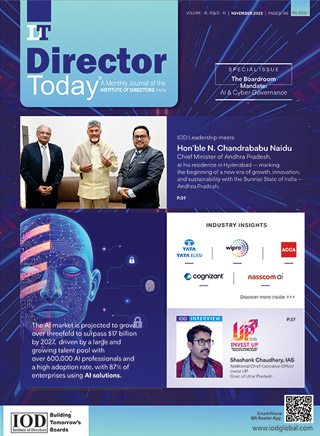Governing Intelligence - The Board's New Mandate in the AI-Cyber Era

In boardrooms across India, a new director has taken a seat - Artificial Intelligence!
It doesn't have a vote, but its influence already shapes strategy, operations, and risk. For corporate leaders, this is a new governance frontier: To harness AI as an engine of growth while governing it as a source of systemic risk. With one of the world's largest digital economies and a deep reservoir of technical talent, India is poised to lead the world in trustworthy and responsible AI. But this requires more than technology adoption, it also demands a new governance mindset. The convergence of AI and cybersecurity is redefining fiduciary duty, expanding board oversight into the realms of data, ethics, and algorithmic accountability.
Promote explainable AI and accountable data practices - where trust becomes a measurable performance metric, not a moral afterthought.
India's AI Landscape and Governance Ecosystem
India today hosts the world's second-largest AI talent pool of over 600,000 professionals, nearly 16% of global AI talent. The Stanford AI Index 2024 highlights India's growing leadership in AI skill penetration and innovation. Government initiatives such as the IndiaAI Mission and the Digital Personal Data Protection (DPDP) Act 2023 are laying the foundation for a governance-first AI ecosystem, which is built on democratized compute, quality data, and ethical frameworks. Yet the transformation comes with paradoxes. AI is not eliminating jobs but reshaping them. Recent workforce shifts in global technology firms underline a structural transition requiring new skills in data stewardship, model oversight, and cyber resilience. At the same time, the line between AI and cybersecurity is disappearing. AI systems are both targets and tools of cyber-attack that are vulnerable to model poisoning, data theft, and deepfake-driven fraud. Boards can no longer view AI solely as innovation; they must see it through the lens of trust, accountability, and resilience.
Boardroom Diagnostic: 5 Questions for Your Next Meeting
1. Data Fortification: Is our data not only clean and compliant but protected from AI-driven cyber threats?
2. Algorithmic Accountability: Can we explain to regulators or customers why our AI made a decision?
3. Talent Fluency: Does our board truly understand AI's strategic and ethical implications?
4. Resilience Drill: Have we tested how quickly we can respond if an AI system is compromised?
5. Ethical Guardrails: Are our AI-ethics principles embedded in everyday processes - or just written in policy?

Strategic Imperatives for Indian Boardrooms
To turn AI's potential into enduring enterprise value, boards must lead from the front.
Six imperatives define this new governance mandate:
1. Mandate AI Fluency at the Top
Move beyond awareness. Sponsor executive-level AI immersion programmes so leaders can question bias, data provenance, and model reliability. In this decade, AI literacy is the new financial literacy.
2. Architect a Culture of Trust-by-Design
Embed ethical safeguards and transparency from day one. Promote explainable AI and accountable data practices where trust becomes a measurable performance metric, not a moral afterthought.
3. Use Governance as a Talent Magnet
The best AI professionals seek purpose as much as pay. Companies known for responsible AI and transparent governance attract superior talent. In the war for AI talent, integrity is your differentiator.
4. Treat Data as a Fortified Strategic Asset
Strong AI performance begins with secure, highquality data. Boards should demand regular cybersecurity audits for AI pipelines and hold thirdparty models to equal compliance standards.
5. Build an Ecosystem - Not Just an In-House Team
No company can innovate alone. Forge alliances with universities, research labs, and national initiatives like IndiaAI to co-develop technologies and cultivate responsible innovators.
6. Shape the Playing Field - Don't Just Play on It
Boards must help shape India's regulatory future. Engage with policymakers to craft frameworks that balance innovation and accountability, supporting initiatives like the National Cybersecurity Strategy 2025 and emerging Responsible AI Standards.
India today hosts the world's second-largest AI talent pool of over 600,000 professionals, nearly 16 % of global AI talent.
Integrating AI into Corporate Governance
AI and cyber oversight can no longer be delegated - it must be owned by the board.
Progressive organizations are establishing Technology & Risk Committees that integrate AI, cyber, and data oversight under one umbrella.
Regular AI risk dashboards should feature in quarterly reviews, tracking model drift, bias audits, data integrity, and incident response times. This elevates AI to the same scrutiny as finance, operations, or ESG.
Key questions for directors to ask:
• Is our data secure, auditable, and ethically sourced?
• Are guardrails built into our systems not bolted on later?
• Does our AI strategy drive long-term value and stakeholder trust?
This is the next evolution of governance from compliance to stewardship, from oversight to orchestration.
Call to Action
Boards must act decisively on being architects of an intelligent, trustworthy enterprise. This begins with institutionalizing AI fluency across leadership, commissioning integrated AI-Cyber risk dashboards, and embedding ethics and resilience into every business decision. Directors should champion alliances with IndiaAI, academia, and industry peers to co-create governance standards and set new benchmarks for responsible innovation. The time for reactive compliance is over; boards must now lead the proactive construction of “Trust Infrastructure” where data, algorithms, and people are all governed with equal vigilance.
Conclusion
As India accelerates into the AI-Cyber era, the mandate for corporate boards is clear: intelligence without integrity is instability. The winners of tomorrow will not be those who deploy AI the fastest, but those who govern it the wisest. When fiduciary duty expands to include algorithmic accountability and cyber resilience, governance itself becomes a strategic asset. In a world where trust defines market value, the most valuable enterprise will be the one whose intelligence is not just artificial but accountable.
Author

Mr. Ankit Bose
He is an experienced professional with over 20 years of expertise in thought leadership, innovation, team development, and a strong drive to explore and develop new business units, technology, and service businesses. Throughout his career, he has held various roles spanning engineering, consulting, strategy, and more, working across continents and in sectors such as Government, Utilities, Telco, Retail, and Manufacturing. Ankit currently spearheads the AI vertical of Nasscom and is dedicated to empowering India by encouraging the industry to embrace AI and adopt digital technologies. He takes the lead in promoting ethical and responsible tech practices, advocating for self-governance.
Owned by: Institute of Directors, India
Disclaimer: The opinions expressed in the articles/ stories are the personal opinions of the author. IOD/ Editor is not responsible for the accuracy, completeness, suitability, or validity of any information in those articles. The information, facts or opinions expressed in the articles/ speeches do not reflect the views of IOD/ Editor and IOD/ Editor does not assume any responsibility or liability for the same.

 Quick Links
Quick Links
 Connect us
Connect us




 Back to Home
Back to Home































